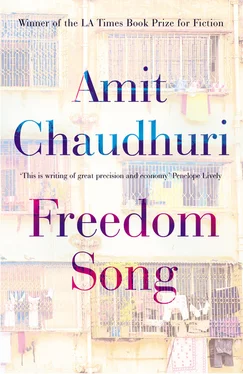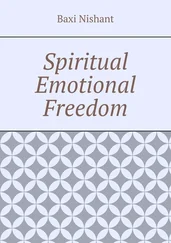Amit Chaudhuri - Freedom Song
Здесь есть возможность читать онлайн «Amit Chaudhuri - Freedom Song» весь текст электронной книги совершенно бесплатно (целиком полную версию без сокращений). В некоторых случаях можно слушать аудио, скачать через торрент в формате fb2 и присутствует краткое содержание. Год выпуска: 2015, Издательство: Oneworld Publications, Жанр: Современная проза, на английском языке. Описание произведения, (предисловие) а так же отзывы посетителей доступны на портале библиотеки ЛибКат.
- Название:Freedom Song
- Автор:
- Издательство:Oneworld Publications
- Жанр:
- Год:2015
- ISBN:нет данных
- Рейтинг книги:3 / 5. Голосов: 1
-
Избранное:Добавить в избранное
- Отзывы:
-
Ваша оценка:
- 60
- 1
- 2
- 3
- 4
- 5
Freedom Song: краткое содержание, описание и аннотация
Предлагаем к чтению аннотацию, описание, краткое содержание или предисловие (зависит от того, что написал сам автор книги «Freedom Song»). Если вы не нашли необходимую информацию о книге — напишите в комментариях, мы постараемся отыскать её.
Freedom Song — читать онлайн бесплатно полную книгу (весь текст) целиком
Ниже представлен текст книги, разбитый по страницам. Система сохранения места последней прочитанной страницы, позволяет с удобством читать онлайн бесплатно книгу «Freedom Song», без необходимости каждый раз заново искать на чём Вы остановились. Поставьте закладку, и сможете в любой момент перейти на страницу, на которой закончили чтение.
Интервал:
Закладка:
~ ~ ~
Khuku and Mini sat side by side on two arm-chairs in the hall, facing the veranda.
Each day, at some point, they talked of the Muslims. They talked of how, by the next century, there would be more Muslims than Hindus in the country. Mini, being the teacher, had the facts and figures. She told Khuku that ‘population control’ was meant for Hindus alone, and Khuku, listening to Mini, began to see Muslims everywhere. They grew excited about the azaan on the loudspeakers, and about Muslim festivals in which people beat themselves with whips and cords. Once, when talking thus, and saying, ‘They should change as well, not just the Hindus,’ they had forgotten that Abdullah the tailor, who had come to take measurements, was sitting, only a small distance away, self-consciously on the sofa, more self-conscious about sitting on the sofa than about anything the two might have said. Khuku had bit her tongue and indicated Abdullah with her eyes to Mini, and said quietly, ‘He didn’t hear us,’ and then, ‘Even if he did, so what?’
They were both in old age, though they did not feel it. Khuku’s face had a few noticeable wrinkles; and these only appeared, emphasized, when she had not slept for two nights. Her grey hairs were camouflaged by the black, and the obvious ones ‘touched up’ with mehndi or dye. There were days when she wandered around the house with mehndi in her hair, which smelled like mud or manure till she had washed it off. And her small body, loved in its present incarnation by her husband and child, had remained constant over the last twenty years. And Mini’s even smaller body, dark skinned, the forehead glowing with the hair pulled back in a small bun, the eyes upon the face not large but frank, as Khuku remembered them from girlhood, now hidden by spectacles — she was the same Mini. The only difference between them were the marks on Khuku’s belly from the Caesarean operation, for she had once borne a child, while Mini’s belly, bulging with a natural plumpness, was smooth and untouched.
‘BJP,’ said Khuku, her eyes larger than usual. ‘I might even vote for the BJP. Why not?’
They spoke defiantly and conspiratorially, as if they were playing a prohibited game. They would stop once Shib arrived at the house.
‘In fact, it was no bad thing that they toppled that mosque,’ said Mini. She looked small and powerful, as if she had unsuspected energies within, and could have gone up to the mosque and toppled it herself, alone. She had quite forgotten about the pain in her leg.
‘No bad thing,’ said Khuku, who agreed with everything that Mini said.
But Khuku and Mini did not believe in Ram or Krishna; Khuku’s personal deity, which she might have created herself, or which had possibly been created by her mother, was one she called Bipad Nashini, or Destroyer of Distress, whom she saw as a maternal figure who watched over her and her family, and whose name she muttered whenever she was worried: ‘Hé bipad nashini, hé bipad nashini.’ This mysterious female divinity resided, it seemed, in Khuku’s heart, there she had her home in the world, and from there she sprang to life when her name was uttered in that worried, childlike way by Khuku.
Long before she either disbelieved or believed in things, Khuku had heard of the Muslims, or the Musholmaan, as a child. Her world was then populated by her mother, her brothers, and by a huge family of ghosts and spirits. It became dark soon, there was no electricity, and she could scarcely keep her eyes open; in the next room, her elder brothers and elder sister and mother kept on talking. In that world, her closest companions were her younger brother, Bhola, who was then no more than an idiot who had barely learnt to speak, and Pulu, who was older than her by a year. Pulu believed in the next life, and in other worlds, where daylight was a soft purple, and he was always getting cuffed on the head by his elder sister for asking so many questions and being such a nuisance. He was brilliant at arithmetic and a great crammer and knew all the tables by heart. Khuku loved him very much, and one of the first words she had ever spoken, ‘Dada,’ referred to him. It was he who first told her of the Hindoos, who were a fierce wandering tribe with swords who cut up everything in their path, as their very name, ‘Hin-doo’, suggested, and Musholmaans, he explained, were ghosts who haunted the dark and hilly regions of Sylhet.
~ ~ ~
In the afternoon, Bhaskar reclined on the bed; his back had been troubling him again. He had not made the long journey to the factory because of it; instead, he had had a full meal, and now he sought the most appropriate position for his head on the pillow. In the morning, he had woken up with limbs quite frozen, and had had to ask his mother for help to get off the bed; he had hopped about like a huge injured bird. Now he lay back and sighed, with a book on yoga in one hand. The pages were light and wispy, and the paper was peppered and flecked with impurities; the Bengali print was faded. Almost each page had another page with a photograph facing it, smoky black and white photographs that were really blue-grey, with figures in them doing various asanas, the first two pages of photos being occupied by Surjomukhi Maharaj, who had written the text, a fat, fair, bearded holy man with small eyes and a smile on his face. The rest of the photos were of thin unnamed men in brief white jangias, immortalized in that blue and white world in dozens of strange postures, straining, as it were, to become something else, to fly, to be transmogrified. The text made unexpected revelations in a deadpan way: ‘Muktabayu-asana: This is good for the digestion. Those who do this daily will not suffer from gas or stomach problems. First lie on your back and breathe in, then slowly raise both your knees. .’ Bhaskar must have read the book more than twenty times, for he had bought it from the Dakkhinee bookshop when he was fifteen. He could only just remember the shopkeeper taking it out of the window, slapping the powdery dust off it, and handing it to him. Bhaskar had at that time been passing through a long phase of interest in yogis and Mr Universes, an interest he had passed on to Manik as well, and their hero and idea of perfection had then been Monohar Aich, the great Bengali body-builder, who had muscles swelling and hardening on every part of his body. Since he had acquired the book, Bhaskar had been much stirred by the importance of the names of the exercises — padmasana, virasana, muktasana — and had interred them as a kind of knowledge. In those days, his mother was always asking him, ‘Have you done your schoolwork?’ and a great lethargy and reluctance filled him as he dragged himself to his textbooks. But, whenever he could, he read the articles in Sportsweek and Sportsworld about Shyam Thapa or Pelé, or flicked through the pages of the yoga book till he had become familiar with the descriptions of the asanas and those thin, bare-chested men in their state of arrested transport, with the pale luminous white wall behind them. When their mother looked at Bhaskar and Manik, she saw two wiry, restive boys, but she also saw, in their eyes, in the way they walked, in the way they spoke occasionally, what they saw themselves as — Tarzan and Hercules — and, vividly, she could see them increasing and filling out to their imaginary proportions, to their ideal, while, at the same time, being able to see them for the two thin boys they were.
Bhaskar had never been, although he was a great shirker of studies, and also a great day-dreamer, a particularly rebellious boy. If his feet ever accidentally brushed against a book, for instance, he immediately and swiftly touched his forehead and chest with his index finger in quick, absent-minded repentance, and as, in those days, books and magazines that were being read by Bhaskar, Manik, or their mother would always be lying by pillows or on the middle of the bed, because the bed served as floor and bed and table at once, and because Bhaskar’s normal mode of locomotion in the room was quick skips, jumps, and runs from bed to floor and floor to bed, his feet were always grazing books, and he, at least five or six times a day, was engaged in making that brief, absent-minded gesture. His day-dreams were the usual ones dreamt by Bengali boys of his age: of alternative lives that were much like the lives of Swami Vivekananda and Subhas Chandra Bose. At the age of seven, he had been given a thin book with broad, flapping pages called We Are Bengalis, with small biographical tales about Vivekananda and Vidyasagar and Tagore, each prefaced by a portrait of a serene and grave face; and some of the stories fired him with pride, and others made him cry. Once he understood what a wonderful thing it was to be a Bengali, and that he was Bengali himself, he went around the house chanting, ‘We are Bengalis! We are Bengalis!’ and this echo, predictably, was taken up by Manik, who had no inkling of what it meant.
Читать дальшеИнтервал:
Закладка:
Похожие книги на «Freedom Song»
Представляем Вашему вниманию похожие книги на «Freedom Song» списком для выбора. Мы отобрали схожую по названию и смыслу литературу в надежде предоставить читателям больше вариантов отыскать новые, интересные, ещё непрочитанные произведения.
Обсуждение, отзывы о книге «Freedom Song» и просто собственные мнения читателей. Оставьте ваши комментарии, напишите, что Вы думаете о произведении, его смысле или главных героях. Укажите что конкретно понравилось, а что нет, и почему Вы так считаете.












